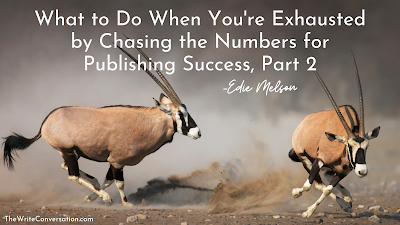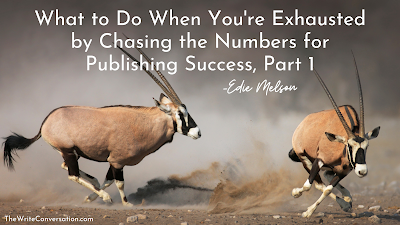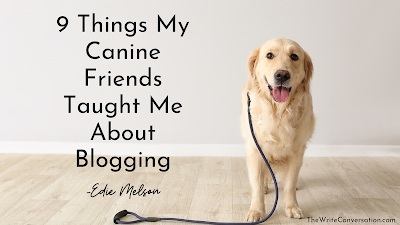Edie Melson's Blog, page 39
September 18, 2024
WHAT TO DO WHEN YOU'RE EXHAUSTED BY CHASING THE NUMBERS FOR PUBLISHING SUCCESS, PART 2

by Edie Melson @EdieMelson
Yesterday I shared how to get past the frustration of growing a platform for marketing and publishing. At the end of this post is a link to that post.
Today, I want to share the questions I ask myself regularly to help me make sure I'm doing my part and letting God do HIS PART! Because truthfully, almost one-hundred-percent of my stress comes when I try to control the parts of publishing that are beyond my reach.
I Stay Focused on My Publishing Purpose By Asking Myself These 12 Questions
1. What is my mission statement? You do have one, I assume. If not, it’s time to work on one. A mission statement is the perfect way to filter out noise and make sure we’re staying true to our calling. (Here’s mine: I believe God has a purpose for everyone’s unique story. I encourage others to live that story by telling stories of my own—through words and pictures. I’m a writer who feels lost without her camera and a reluctant speaker who loves to encourage an audience. All my books point to the transformational possibilities inside each of us when we tap into our God-given strengths) If you don't have an author mission statement, here's a link to my blog post on Creating an Author Mission Statement . 2. How does my current project reflect either all or part of my mission statement?3. Who is my audience?4. Where is my audience?5. What is God showing me through my current circumstances and how does that align?6. What felt need(s) dovetail with the previous 5 answers?7. How much time do I have to spend on my current project(s)?8. How much time do I have to spend online?9. What are my favorite ways to interact (written words, video, audio, images, graphics, etc)?10. What do I enjoy about being online?11. What do I dislike most about being online?12. How much time AM I spending with God daily?
Question #12 is truly the most important one for me. When I begin to get busy and my daily time with God shrinks, EVERYTHING falls apart. Now it's your turn. What do you do to stay on track? Be sure to share your thoughts in the comments section below.
Also, here's a PDF version of the Stay Focused on Your Publishing Purpose By Asking These 12 Questions
Don't miss the rest of this series! Part 1 of WHAT TO DO WHEN YOU'RE EXHAUSTED BY CHASING THE NUMBERS FOR PUBLISHING SUCCESS Part 2 of WHAT TO DO WHEN YOU'RE EXHAUSTED BY CHASING THE NUMBERS FOR PUBLISHING SUCCESS
TWEETABLEPart 2 of What to do When You're Exhausted by Chasing the Numbers for Publishing Success from @EdieMelson (Click to Tweet)
 Edie Melson is a woman of faith with ink-stained fingers observing life through the lens of her camera. No matter whether she’s talking to writers, entrepreneurs, or readers, her first advice is always “Find your voice, live your story.” As an author, blogger, and speaker she’s encouraged and challenged audiences across the country and around the world. Her numerous books reflect her passion to help others develop the strength of their God-given gifts and apply them to their lives.Connect with her on her WEBSITE, through FACEBOOK, X (FORMALLY TWITTER) and on INSTAGRAM.
Edie Melson is a woman of faith with ink-stained fingers observing life through the lens of her camera. No matter whether she’s talking to writers, entrepreneurs, or readers, her first advice is always “Find your voice, live your story.” As an author, blogger, and speaker she’s encouraged and challenged audiences across the country and around the world. Her numerous books reflect her passion to help others develop the strength of their God-given gifts and apply them to their lives.Connect with her on her WEBSITE, through FACEBOOK, X (FORMALLY TWITTER) and on INSTAGRAM.
Published on September 18, 2024 22:00
September 17, 2024
What to Do When You're Exhausted by Chasing the Numbers for Publishing Success, Part 1

by Edie Melson @EdieMelson
Who is frustrated by online marketing—from email lists to websites, social media to Amazon keywords?
I think we can all agree we’re exhausted by the rat race. The world has us chasing an ever-changing target.
Let’s think about that statement for a moment.
THE WORLD has us chasing an ever-changing target.
I don’t see God anywhere in that sentence, do you?
Personally, I believe the world has sold us out when it comes to marketing. We have been told to be successful we need to grow our numbers, increase our reach, and find ways to get to our audience.
But what if we’re looking at things from the wrong perspective? What if none of this was part of God’s plan when He called us to share our words?
What if, His purpose for us is obedience, service, and love? Not growth, marketing, and sales?
God has given me personally a passage of Scripture—which hangs above my desk—to help me focus on HIS will for me and my interactions.
Do nothing from selfish ambition or conceit, but in humility count others more significant than yourselves. Let each of you look not only to his own interests, but also to the interests of others. Philippians 2:3 – 4
Consider how our goals would change if we measure success from God’s perspective instead of the world’s?We would find joy as God is pleased with our obedienceWe would find contentment as we walk in the strength of our part in God’s planWe would find peace as we let go of the things that are not our responsibility
Here’s how I think things might go if we followed God’s path:
1. God would inspire us and we would obediently set down our words—sometimes spoken, sometimes written, sometimes set to music, sometimes through video.2. We would obediently let people know about our message—websites, podcasts, manuscripts, speaking.3. We would trust God to do HIS PART—guide us to the agent we need, who will find the publisher God chooses. a. We would NOT worry and stress and strive for numbers or position.b. We would NOT fall for the lie that we are entitled to a publisher or to a certain level of visibility.c. We would NOT allow envy, jealousy, or competition to enter our hearts and dominate our actions.4. We would serve the people God sets before us. Whether we have one or one thousand, we will be obedient. 5. We follow the purpose of our message as we share with those God sets before us. This doesn’t mean we don’t use the tools God has given us. We can trust God to do His part, but we must also do ours. And part of that is learning to use those tools, WITHOUT relying on them to solve all our problems.a. Social mediab. Marketingc. Speakingd. Blogginge. Writingf. Proposal writingg. Amazon interfaces6. We would pray for the people who are currently reading our words and interacting with us.
I know this sounds too good to be true. I can hear your comment:Publishers and agents tell us we MUST have numbers
Yes, I've hear them say that. But let me ask you a question:Who reading this has seen someone get a contract who does NOT have the numbers? Every week I see people with "worse" numbers than someone else, get awarded the contract.
God is the One who decides where our words land. THAT is truth.
What we must not do is expect to be the one who dictates where our words and our message lands.
God is able to do what He says He will:
For by grace you have been saved through faith. And this is not your own doing; it is the gift of God,9 not a result of works, so that no one may boast. 10 For we are his workmanship, created in Christ Jesus for good works, which God prepared beforehand, that we should walk in them. Ephesians 2:8 – 10
God didn’t save us for fame and fortune. God didn’t call us to get richGod called us to the works HE ordained before the beginning of the world!
Consider this passage as it pertains to publishing and speaking:
I planted, Apollos watered, but God gave the growth. So neither he who plants nor he who waters is anything, but only God who gives the growth. He who plants and he who waters are one, and each will receive his wages according to his labor. For we are God's fellow workers. You are God's field, God's building. 1 Corinthians 3:6 – 9
This publishing and speaking thing takes a lot of people—whether we’re going the traditional route or the indie route.
Part two of this post will share some of the questions we need to ask ourselves so we can stay aligned with God's purpose for our writing. But in the mean time, what about you? How do you deal with the frustration of chasing numbers?
TWEETABLEWhat to Do When You're Exhausted by Chasing the Numbers for Publishing Success from @EdieMelson (Click to Tweet)
 Edie Melson is a woman of faith with ink-stained fingers observing life through the lens of her camera. No matter whether she’s talking to writers, entrepreneurs, or readers, her first advice is always “Find your voice, live your story.” As an author, blogger, and speaker she’s encouraged and challenged audiences across the country and around the world. Her numerous books reflect her passion to help others develop the strength of their God-given gifts and apply them to their lives.Connect with her on her WEBSITE, through FACEBOOK, X (FORMALLY TWITTER) and on INSTAGRAM.
Edie Melson is a woman of faith with ink-stained fingers observing life through the lens of her camera. No matter whether she’s talking to writers, entrepreneurs, or readers, her first advice is always “Find your voice, live your story.” As an author, blogger, and speaker she’s encouraged and challenged audiences across the country and around the world. Her numerous books reflect her passion to help others develop the strength of their God-given gifts and apply them to their lives.Connect with her on her WEBSITE, through FACEBOOK, X (FORMALLY TWITTER) and on INSTAGRAM.
Published on September 17, 2024 22:00
September 16, 2024
Embracing the Power of Words: A Guide for Writers

by Katherine Hutchinson-Hayes @KHutch0767
Embarking on a writer's journey can be a daunting and solitary pursuit, filled with challenges, self-doubt, and rejection. Yet, through these obstacles, we develop our unique voices and contribute to the powerful creative work of storytelling.
As writers, it’s important to remember we’re part of a supportive community that understands the highs and lows of this creative calling. Whether fiction, non-fiction, poetry, or screenplays, all writers share a bond as pioneering storytellers.
Recognizing the potential impact of our words, let’s be encouraged to embrace our voice and share stories that have the power to inspire, educate, and uplift others. Writing isn’t just about crafting sentences and paragraphs. It’s about connecting profoundly and emotionally with readers, evoking laughter, tears, and introspection.
To develop our craft, we should set aside dedicated time to pick up our P.E.N.
P—Persist—Persisting as a writer involves dedicating regular time to writing, seeking feedback, setting achievable goals, and connecting with a supportive writing community.
E—Empower—To empower ourselves as writers, we must cultivate self-confidence in our writing abilities and stay true to our unique voice and vision.
N—Nurture—To nurture our writing, it’s vital to create a supportive environment that encourages creativity and growth.
Here are some ways writers can pick up our PEN:
1. Set Aside Dedicated Time: Schedule regular time for writing and treat it as a priority. Consistency is critical to nurturing our writing practice.
2. Read Widely: Expose ourselves to various genres and styles of writing. Reading can inspire new ideas and improve our writing skills.
3. Seek Feedback: Share your work with trusted friends, writing groups, or mentors to receive constructive criticism and encouragement.
4. Embrace Learning: Attend writing workshops, classes, or seminars to expand our knowledge and learn new techniques.
5. Practice Self-Compassion: Embrace imperfection and understand that writing is a continuous learning experience.
6. Find Inspiration: Explore different sources of inspiration, such as nature, art, music, or personal experiences. Being open to inspiration can fuel our creativity.
7. Set Realistic Goals: Establish achievable writing goals to maintain motivation and a sense of accomplishment.
8. Revise and Edit: Dedicate time to revise and edit our work. Excellent writing often comes from multiple drafts and revisions.
9. Connect with Other Writers: Engage with fellow writers through in-person or online communities. Sharing experiences and getting support from others can be invaluable.
10. Believe in Ourselves: Cultivate confidence in our writing abilities and stay true to our unique voice and vision.
By implementing these practices, we can foster thriving writing practices that allow our creativity to flourish.
Our words have the power to transcend boundaries, bridge divides, and illuminate the human experience. May we continue to write with courage, authenticity, and unwavering determination as we make our voices heard and our stories known.
TWEETABLEEmbracing the Power of Words: A Guide for Writers from @KHutch0767 on @EdieMelson (Click to Tweet)
 Dr. Katherine Hutchinson-Hayes is a review board member and contributor to Inkspirations (an online magazine for Christian writers), and her writing has been published in Guideposts. Her work in art/writing is distinguished by awards, including the New York Mayor’s Contribution to the Arts, Outstanding Resident Artist of Arizona, and the Foundations Awards at the Blue Ridge Mountains Christian Writer’s Conference (2016, 2019, 2021). She is a member of Word Weavers International and serves as an online chapter president and mentor. She belongs to FWA (Florida Writers Association), ACFW (American Christian Fiction Writers), CWoC (Crime Writers of Color),
Dr. Katherine Hutchinson-Hayes is a review board member and contributor to Inkspirations (an online magazine for Christian writers), and her writing has been published in Guideposts. Her work in art/writing is distinguished by awards, including the New York Mayor’s Contribution to the Arts, Outstanding Resident Artist of Arizona, and the Foundations Awards at the Blue Ridge Mountains Christian Writer’s Conference (2016, 2019, 2021). She is a member of Word Weavers International and serves as an online chapter president and mentor. She belongs to FWA (Florida Writers Association), ACFW (American Christian Fiction Writers), CWoC (Crime Writers of Color),AWSA (Advanced Writers and Speakers Association), and AASA (American Association of School Administrators). She serves on the nonprofit organization Submersion 14 board and the 540 Writer’s Community board and is an art instructor for the nonprofit organization Light for the Future. Katherine hosts the podcast Murder, Mystery & Mayhem Laced with Morality. She has authored a Christian Bible study for women and is currently working on the sequel to her first general market thriller novel. Her thriller A Fifth of the Story will debut in February 2024 through Endgame Press.
Katherine flourishes in developmental editing and coaching writers. She has a twenty-year career in education, leadership, and journalism. Katherine freelances as an educational consultant for charter schools, home school programs, and churches. In this role, she has written and edited curriculum, led program development, and helped manage growth facilitating and public relations.
She also works as an editor and book coach through her consulting business. Katherine provides skill, accountability, and professionalism so clients can begin, develop, and finish their writing projects for publication.
Published on September 16, 2024 22:00
September 15, 2024
Types of Marketing Campaigns for Authors

by Karen Whiting @KarenHWhiting
For authors, a marketing campaign is a plan to get people excited and interested in your book, brand, or you, so they will respond with an action. Other campaigns maybe be to connect with media or meeting planners. The action may be to buy the book, signup for your newsletter, or book you to speak. The plan consists of a series of activities that target the audience with a message. Activities used in campaigns are the marketing tools including keywords, lead magnets, video clips, email sequences, and press releases.
Different Campaign Types for AuthorsSales related campaigns that pitch products include book launches/relaunches, or sales events.Brand/rebranding awareness and email campaigns grow followers, raise awareness of what you offer, and help readers connect to you.PR campaigns are publicity campaigns to bring awareness to a new book or course and reach for media interviews. It's also good for damage control when needed.Lead generation campaigns target specific connections such as meeting planners, to get speaking engagements.Cross marketing and community building campaigns are joint campaigns to share followers and grow one another's email lists.Ad campaigns are paid marketing, on social platforms, in magazines, or programs books where you speak and sell books. These target for specific reasons such as attracting customers at an event, or to get people to join a group, or go to your website.SEO campaigns use key words and phrases to target specific readers.Influencer marketing campaigns use an influencer or celebrity to reach a larger audience. Social media campaigns reach a social media platform with a specific objective.
Sample Marketing Campaigns for Authors
Any campaign can use video, SEO, ads, and other tools. For any campaign set an objective and choose activities to meet the goal. Consider what tools will help the campaign be successful.
Sales campaigns might tie to a holiday, such as one my co-author and I did for Mother's Day with the kindle books on sale for 99 cents each. We created memes and posts to bring awareness of the sale, posted on social media platforms, and I did a store event. Posts shared reasons why the book's benefits and glimpses of the content.
Brand awareness might be done when you have revised brand or expanded your brand. My brand on growing wholesome families has not changed, but now that I have a four-book-series for moms, I have an ongoing sub-brand awareness with 5 landing pages with email sequences plus grouped together on my website. I'll work on a sales campaign before Christmas to sell the complete set.
PR campaigns I do with each book release to get coverage in print, TV, radio, and podcasts. It's not always tied to a book. This year as Israel's Ministry of Tourism chose me as one of 4 journalists from the US a special tour of Israel. I created a press release about the trip. I had local print coverage, did some TV shows, and several radio and podcast shows. I also used the opportunities to announce a 2026 book release on biblical archeology for kids.
A a lead campaign would be great to send information to meeting planners. I might make it a page on my website instead of a newsletter as I don''t have a meeting planner list, but I have a speaking page on my website and I'm part of a speaker's organization. I would include a video of my speaking and sharing my focus. I'd include a link to download my speaker one-sheet. I'd also have it available to send meeting planners.
Cross marketing is done when we share posts and write reviews, but sometimes it's a specific campaign. I've joined some that were scavenger hunts and Christmas in July campaigns. I do one for the Christmas season where I find 10 or11 other authors in different genres with a book on the topic I chose. I did joy one year and peace another year. It's a good way to grow email lists and bring awareness of books in other genres for Christmas shoppers.
I've done FB ad campaigns that target a specific area when I'll be speaking, such as the area around where I'll have a booth at an event. When I did this for a retail show I noticed quite a few retailers were aware of my newest title before I signed the book. At a homeschool show moms came for one specific book for which I ran an area targeted ad, and then they looked at others.
SEO campaigns tend to be ongoing. AI brought a change to SEO where the keywords at the beginning decrease visibility while an anecdote or personal experience increases traffic. My website traffic had dropped drastically. I do short posts once or twice a week with a little personal experience opener, some SEO words in the next little bit, an outside link to an article or interview, and an inside link to buy a book. It's increased the web traffic.
Influencer marketing campaigns generally means you know a celebrity well or you hired one. For my 2026 release I have someone with a huge following who will help promote the book.
Social media campaigns I do tend to be Pinterest where I have a hidden board I release when the book releases with other prepared memes prepared to add daily.
Let the types of campaigns expand your marketing plans!
TWEETABLETypes of marketing Campaigns for Authors from @KarenHWhiting on @EdieMelson (Click to Tweet)
 Karen Whiting (WWW.KARENWHITING.COM) is an international speaker, former television host of Puppets on Parade, certified writing and marketing coach, and award-winning author of twenty-seven books for women, children, and families. Her newest book, The Gift of Bread: Recipes for the Heart and the Table reflects her passion for bread and growing up helping at her grandparent’s restaurant. Check out her newest book Growing a Mother’s Heart: Devotions of Faith, Hope, and Love from Mothers Past, Present, and Future. It's full of heartwarming and teary-eyed stories of moms.
Karen Whiting (WWW.KARENWHITING.COM) is an international speaker, former television host of Puppets on Parade, certified writing and marketing coach, and award-winning author of twenty-seven books for women, children, and families. Her newest book, The Gift of Bread: Recipes for the Heart and the Table reflects her passion for bread and growing up helping at her grandparent’s restaurant. Check out her newest book Growing a Mother’s Heart: Devotions of Faith, Hope, and Love from Mothers Past, Present, and Future. It's full of heartwarming and teary-eyed stories of moms.Karen has a heart to grow tomorrow’s wholesome families today. She has written more than eight hundred articles for more than sixty publications and loves to let creativity splash over the pages of what she writes. She writes for Crosswalk. Connect with Karen on Twitter @KarenHWhiting Pinterest KarenWhiting FB KarenHWhiting.
Published on September 15, 2024 22:00
9 Things My Canine Friends Taught Me About Blogging

by Edie Melson @EDIEMELSON
Most of you know I’m an animal lover. We had one cat, Emily Dickinson, and our son's dog, Cosmo. I don’t know what I’d do without my four-legged friends cheering me on as I work every day.
But they’re more than just great companions, they’ve got a lot to teach me. I’ve shared lessons from Emily before in a devotion on BEING STILL. So today I’d like to pass along some of the wisdom I’ve gleaned from my dogs.
Blogging Tips for Writers from My Dog
1. Go all in. When you play, play. When you work, work. And when you rest, rest. My dogs are one hundred percent involved in whatever they’re doing. Beyond that, I’ve discovered that there’s no such thing as a multi-tasking dog. The same should be true for bloggers. Focus on the task at hand by setting aside time to blog. Don’t think of it as work you do in the spaces.
2. Chasing squirrels never ends well. It may be fun, but it rarely bring value to what you’re doing. When our boys were young (and so was Jake) they had the great idea of tying his leash to the handlebars of a scooter so he could pull them down the street. It went well until a squirrel darted in front of Jake. He took off one direction, the son on the scooter went another way. There was definitely collateral damage although none of it permanent. The same thing can with blogging. Leave the squirrel chasing for play time and stay focused on where you’re going in your post and avoid the collateral damage.
3. Loyalty is everything. My dogs are friendly with almost everyone, but their loyalty is to me. As bloggers, we have to have that same kind of loyalty toward our readers.
4. 50 New smells a day. For a dog, going outside is more than exercise, it’s the ability to gather information about the world around them. As bloggers, we can’t become so immersed in our own corner of the world and especially only our point of view.
5. Keep digging until you have what you need. Both our dogs have favorite toys. But when our son's dog was a puppy, his favorite pastime appeared to be getting his stuck under things. He’s learning though, to not just rely on us to get what he needs. He’s learning how to work and dig until he gets them back. As bloggers we can’t just rely on the information others provide. We have to be willing to learn, grow, and dig out what we need to be the best we can be.
6. Wag more, bark less. When my dog comes up to me, he’s grinning and his tail is wagging. He doesn’t approach me barking and growling. We need to make sure we interact with people online by wagging, not barking. Think before you post and keep it positive, you’ll never regret being nice.
7. Puppy treats make the worst job easier. Both our dogs love treats, but training our puppy is giving us a new appreciation about how valuable they are. Treats are also a good way to get me to finish a job I’m dreading.
8. Be ready for an adventure and travel light. My dogs are always ready to go for an adventure. Don’t be too tied to home base. As bloggers (and writers) we can pick up and go at the drop of a hat.
9. Always on guard. My dogs are always aware of what’s going on around them. They may appear to be sleeping soundly or playing hard, but if someone comes to the door, they are the first to alert. Because blogging is an online activity, we also need to always be alert. We shouldn’t be fearful, but we do need to be smart and stay aware.
These are some of the lessons I’ve learned, what has your pet taught you about blogging, writing or even life? Be sure to share your thoughts in the comments section below.
Don’t forget to join the conversation!Blessings,Edie
TWEETABLE9 Things My Canine Friends Taught Me About #Blogging - @EdieMelson (Click to Tweet)
 Edie Melson is a woman of faith with ink-stained fingers observing life through the lens of her camera. No matter whether she’s talking to writers, entrepreneurs, or readers, her first advice is always “Find your voice, live your story.” As an author, blogger, and speaker she’s encouraged and challenged audiences across the country and around the world. Her numerous books reflect her passion to help others develop the strength of their God-given gifts and apply them to their lives.Connect with her on her website, through Facebook, X (formally Twitter) and on Instagram.
Edie Melson is a woman of faith with ink-stained fingers observing life through the lens of her camera. No matter whether she’s talking to writers, entrepreneurs, or readers, her first advice is always “Find your voice, live your story.” As an author, blogger, and speaker she’s encouraged and challenged audiences across the country and around the world. Her numerous books reflect her passion to help others develop the strength of their God-given gifts and apply them to their lives.Connect with her on her website, through Facebook, X (formally Twitter) and on Instagram.
Published on September 15, 2024 05:10
September 13, 2024
Reading, Writing, And A Little Bit of Easy Arithmetic

by Beth K. Vogt @BethVogt
“Reading is breathing in; writing is breathing out.” Pam Allyn (1963-), American literacy expert & author
Whatcha’ reading, writer friends?
As I write this post, I’m on a reading streak. I know it, because my Kindle is keeping me posted with fun little graphs on how much I’ve read. As of today, I’ve read 5 weeks in a row and 10 days in a row. And I’ve read 10 more days this month than I read in July.
Now that’s my kind of math, my friends.
To be honest, I’ve struggled to read in recent years. My excuse? I’ve been too busy writing. When I wasn’t writing, I was editing other authors’ manuscripts. Reading for pleasure?
Not happening.
All the while, I missed relaxing with a good book. Slipping away into a fictional story world where the imaginary characters became oh-so-real. And yes, I know reading makes me a better writer.
“Read everything—trash, classics, good and bad, and see how they do it. Just like a carpenter who works as an apprentice and studies the master. Read! You'll absorb it. Then write. If it is good, you'll find out.”William Faulkner (1897-1962), American writer
This year, I decided things had to change.
I started off 2024 with one overall goal: to read more books. Pretty simple, right? Even if I just read one book a month, that would an improvement over the past few years. So far this year, I’ve read 48 books, a mix of both fiction and nonfiction. My best months were January and August, when I read 11 books. My goal continues to be to read more books than I had read in 2023.
And I’m doing it.
Back to you, writer friends, and the question I asked at the beginning of this blog post:
Whatcha’ reading?
Are you reading for pleasure? Reading books about our writing craft? A bit of both? Did you start off the year with a reading goal or some sort of plan? Do you think reading makes you a better writer?
I’d love to know how you fit reading into your writing life. Do you, like me, struggle with reading? Let’s talk about it in the comments. What’s your biggest challenge when it comes to finding time to read?
TWEETABLEReading, Writing, And A Little Bit of Easy Arithmetic from @BethVogt on @EdieMelson (Click to Tweet)
 Beth K. Vogt believes God’s best often waits behind the doors marked “Never.” She’s authored 15 novels and novellas, both contemporary romance and women’s fiction. Beth is a Christy Award winner, an ACFW Carol Award winner, and a RITA® finalist. Her newest contemporary romance novel, Dedicated to the One I Love, released June 20, 2023. Her novel Things I Never Told You, book one in her Thatcher Sisters Series by Tyndale House Publishers, won the 2019 AWSA Golden Scroll Award for Contemporary Novel of the Year. An established magazine writer and former editor of the leadership magazine for MOPS International, Beth blogs for Learn How to Write a Novel and The Write Conversation and also enjoys speaking to writers group and mentoring other writers. She lives in Colorado with her husband Rob, who has adjusted to discussing the lives of imaginary people. Connect with Beth at bethvogt.com.
Beth K. Vogt believes God’s best often waits behind the doors marked “Never.” She’s authored 15 novels and novellas, both contemporary romance and women’s fiction. Beth is a Christy Award winner, an ACFW Carol Award winner, and a RITA® finalist. Her newest contemporary romance novel, Dedicated to the One I Love, released June 20, 2023. Her novel Things I Never Told You, book one in her Thatcher Sisters Series by Tyndale House Publishers, won the 2019 AWSA Golden Scroll Award for Contemporary Novel of the Year. An established magazine writer and former editor of the leadership magazine for MOPS International, Beth blogs for Learn How to Write a Novel and The Write Conversation and also enjoys speaking to writers group and mentoring other writers. She lives in Colorado with her husband Rob, who has adjusted to discussing the lives of imaginary people. Connect with Beth at bethvogt.com.
Published on September 13, 2024 22:00
Value of a Writing Word Sprint

by Tammy Karasek @TickledPinkTam
Alone or in a group, there is great value in a writing word sprint. There are many variations on how you can do a sprint. I’ve participated in word sprints with a group in person as well as online. Online you can meet-up on Zoom, Facebook group, Discord, and more. The most important part of a word sprint is you are not allowed to stop and edit. You must write without worrying about your spelling or incorrect sentences. As soon as the leader says go—you start typing.
I’ll be honest, the first time I did this and I heard we could not backspace or correct spelling, it made this perfectionist sweat a bit. But then when I saw how my mind started flowing, it became a fun challenge to achieve that word count.
An in-person word sprint I participated in was a blast! Once we all arrived and set our little writing spot up, we each had to use the paper the leader passed out to write down the amount of words we’d like to achieve in the first 30-minute sprint. At the end of the 30-minute sprint, the leader made us raise our hands, look at our word count, then write that number beside the number on our paper. Each person who hit or surpassed their goal had to stand up. Each of those folks received a full-size candy bar. Those that didn’t, received a mini candy bar for their effort. This group had other kinds of prizes at the end of each 30-minute sprint. Once we finished up for the day, we all received a writing sticker if we hit our goal at least four out of the six word sprint sessions.
The other fun part of the Word Sprint Write-In was at the end of each of those 30-minutes sprints we were given a chance to read out loud a sentence we wrote that we loved.
When you decide to gather writers and do a word sprint, you can design it any way you’d like. Whether you have incentives or you just set the timer and go, make sure each writer understands what they are to do. And explain this is not a competition with each other, but rather a challenge to get your juices flowing.
TWEETABLEValue of a #Writing Word Sprint from @TickledPinkTam on @EdieMelson (Click to Tweet)
 Tammy Karasek uses humor and wit to bring joy and hope to every aspect in life. Her past, filled with bullying and criticism from family, drives her passion to encourage and inspire others and give them The Reason to smile. She’s gone from down and defeated to living a “Tickled Pink” life as she believes there’s always a giggle wanting to come out! A writer of Romance—with a splash of sass. She’s also The Launch Team Geek helping authors launch their books and also a Virtual Assistant for several best-selling authors. Don't miss her recent book, LAUNCH THAT BOOK, just released in November.
Tammy Karasek uses humor and wit to bring joy and hope to every aspect in life. Her past, filled with bullying and criticism from family, drives her passion to encourage and inspire others and give them The Reason to smile. She’s gone from down and defeated to living a “Tickled Pink” life as she believes there’s always a giggle wanting to come out! A writer of Romance—with a splash of sass. She’s also The Launch Team Geek helping authors launch their books and also a Virtual Assistant for several best-selling authors. Don't miss her recent book, LAUNCH THAT BOOK, just released in November. Her work was also published in a Divine Moments Compilation Book—Cool-inary Moments. She’s also the Social Media Manager for the Blue Ridge Mountains Christian Writers Conference, Founding President and current Vice-President of ACFW Upstate SC, and Founding President of Word Weavers Upstate SC. She’s a writing team member for The Write Conversation Blog, Novel Academy, MBT Monday Devotions, The Write Editing and more. Connect with Tammy at HTTPS://WWW.TAMMYKARASEK.COM.
Published on September 13, 2024 22:00
September 12, 2024
Words with Friends: The Value of Creating a Writing Community

by Lilka Raphael @Lilka_Raphael
“Alone we can do so little; together we can do so much.” – Helen Keller
Writing is a solitary endeavor, but it doesn’t have to be. Though most of us sit alone at our keyboards, writing is gratifying when we associate with other writers. Even if social gatherings make you cringe, consider the following opportunities to mingle while honing skills.
Different Ways to Build a Writing Community
Writing partnersCo-authors brainstorm and cooperate on everything from speculative fiction to technical manuals. If you can partner with someone already proficient in your genre, even better. Developmental editors can propose suggestions and ask the questions that expand a universe, define characters, and make a storyline cohesive.
However, if that level of collaboration is too stressful, consider a different kind of writing partner. A trusted writer that offers honest opinions or proofs your submissions helps propel mediocre writing into something great. My writing partners hold me accountable for any lapses in progress. We motivate each other to stay focused and productive. I enjoy talking with other writers who commiserate over word count and vet my choices. One additional bonus is having someone to travel with when attending conferences.
Writing CommunitiesWorkshops, conferences, and critique groups allow us to meet like-minded writers who can push us toward our goals. Book fairs and festivals are also wonderful places to meet and greet people with common interests and aspirations. There are endless online communities for every genre. The camaraderie is enjoyable even for introverts like me. I have met people at conferences that I now consider friends.
Industry ProfessionalsNearly every agent, author, or editor I have encountered has given me priceless advice. I have been pleasantly surprised as they have generously directed, referred, or introduced me to other professionals in the industry. One in particular, graciously took me under her wing. Still, we must push past insecurity and communicate with them to gain the benefit of their expertise.
Many writing coaches, agents, and editors promote online workshops that are not only informative but also allow you to correspond with them directly. Success is rarely a solitary endeavor. Publishing insiders provide the guidance that produces the next bestseller. Finally, stay connected with the professionals you already know.
Divine AssistanceOur Father is by far the best writing partner I have. He gives me the inspiration and stamina to continue when I’m at a loss for words. I can struggle for hours without Him or get assignments drafted in minutes. God does not give us a task we are unable to accomplish. However, we may require His help to complete it. I find myself with more ideas than I can capture when I ask for His words, not mine. This is particularly important if we write to encourage, teach, or comfort. God knows the appropriate words that effectively get His message to those who need it most.
We don’t have to write in isolation. Playing with words is far more rewarding when we play together. Allocate time for words with friends and make the task of writing enjoyable.
A wise man will hear and increase learning, And a man of understanding will attain wise counsel, Proverbs 1:5 KNJV
TWEETABLEWords with Friends: The Value of Creating a Writing Community from @Lilka_Raphael on @EdieMelson (Click to Tweet)
 A Florida native, Lilka Finley Raphael has been a licensed pharmacist for over thirty years. Her passions for writing, gardening, and photography prompted her to share her experiences and life lessons on her blogs B Is for Blessed and God, autism, & me. You can learn more about her at lilkaraphael.com
A Florida native, Lilka Finley Raphael has been a licensed pharmacist for over thirty years. Her passions for writing, gardening, and photography prompted her to share her experiences and life lessons on her blogs B Is for Blessed and God, autism, & me. You can learn more about her at lilkaraphael.comLilka’s greatest achievements are her two adult sons who have flown the nest. Happily married for thirty-two years, she lives east of Atlanta with her husband, Rod. They now share their home with two German Shepherds—Holly and Ivy—and one naughty kitty, Moxie.
Published on September 12, 2024 22:00
September 11, 2024
Ten Tips for Going the Extra Mile with a Writing Project

by Julie Lavender @JLavenderWrites
What does it mean to go the extra mile? How far is a mile in relation to a published manuscript?
The Bible says in Matthew 5:41, “And if anyone forces you to go one mile, go with him two miles.” The phrase “going the second mile” has found its way into our modern vernacular and isn’t always used in the context of this verse. However, I think “going the extra mile” lends itself to the perfect visual for a successful writing journey.
The publishing journey from idea to publication is not an easy one. It’s a long and convoluted path most of the time, and upon occasions, it can be a quick journey. Going the extra mile when you’ve received an acceptance for an article or book and giving more than one hundred percent to that opportunity can help you land other opportunities with that publishing house or magazine.
As a personal example, my husband David and I had the blessed opportunity to work with a new editor last fall to produce four educational titles for children.
Surprisingly, our contract didn’t require any rewrites or editing responsibilities. But after finding a minor error with a photograph and caption, we asked to proof all four books. (Mind you – we’d already received final payment …. And if you know anything about writing educational books, you’ll know that paycheck was quite small. However, the rewards to us of publishing nonfiction material for kids that finds its way from a school library into the hands of a child doesn’t have a price tag.)
My husband and I poured over the manuscripts and actually found several mistakes that needed correction. The editor was very gracious and grateful and thanked us profusely.
Just a couple of months later, the editor reached out and asked for suggestions of educational books we might enjoy writing in a book series. He made no guarantees, but said he’d pitch our ideas to some of his publishing house clients. Fast forward a few more weeks, and his email to us said, “Are you ready to write some books?” An educational company liked three of our ideas and wanted to turn them into six-book series. If you’re still with me and doing the math, that’s eighteen books. Eighteen books resulted from our attention to detail and going the extra mile!
Going the extra mile may not always result in an 18-book contract, but it can certainly earn you another opportunity with that house or editor.
Here are ten tips I’ve learned over the years about going the extra mile on writing project:
1. Check the spelling of the editor’s name before sending.
2. Scrutinize your work with a fine-tooth comb and make sure no grammatical errors or punctuation typos occur.
3. Check format carefully to make sure you follow the publishing houses guidelines to include such points as one space or two after a period, flush left for paragraphs or indent, single space paragraphs and double space between paragraphs or double space throughout. Make sure to use the right font and size.
4. Turn the manuscript in on time or early.
5. Be teachable, kind, and respectful when an editor makes suggestions for revisions or rewriting. There’s a reason you are the writer and he or she is the editor.
6. Be willing to do as many revisions as requested, within reason according to what your contract states, so that you can help make this published piece the best it can possibly be.
7. If the editor asks for reasonable extras that you may not feel are included in your contract, be willing to bend and go the extra mile to make this a product you’ll be proud of.
8. For nonfiction especially, fact check everything you’ve sent even after the editing process. Editors are amazing and know what they are doing. However, they’re still human and occasionally miss something.
9. Pray for your editor before, during, and after the process. Pray for the publishing house and every reader God leads to your published work.
10. Thank your editor, publicity contact, marketing person, and any others who help bring this manuscript to life. Share your enthusiasm and gratefulness for the opportunity to be part of their publication or house. And don’t forget to share on social media in a non-boastful way about your piece when it comes out. Mention your article or book and be willing to praise the publishing house or magazine in your post as well.
Going the extra mile when turning in a writing project will endear you to that editor and publishing house and can certainly lead to future work projects. How do you go the extra mile in your writing journey? Join the conversation and share your tips.
TWEETABLE10 Tips for Going the Extra Mile with a Writing Project @JLavenderWrites on @EdieMelson (Click to Tweet)
 Julie Lavender’s first picture book comes out next month with End Game Press. A Gingerbread House makes its debut in October. Julie is the author of books for adults and kids, and she and her husband are busy completing eighteen books for the educational market that will launch next year.
Julie Lavender’s first picture book comes out next month with End Game Press. A Gingerbread House makes its debut in October. Julie is the author of books for adults and kids, and she and her husband are busy completing eighteen books for the educational market that will launch next year.
Published on September 11, 2024 22:00
September 10, 2024
How to Analyze a Magazine Before Writing for It

by Linda Gilden @LindaGilden
Driving down the road, a great idea for a magazine article pops into your head. You have a head full of points and an outline is forming. By the time you get home you should have a full article ready to flesh out for a magazine you are only sort of familiar with. You have read the magazine a time or two and know you could write for them. You enjoy the writing and the style of the magazine you want to pitch it to and have often thought while reading it, “I could probably have written that.”
Once you get home, you look on your reference shelf and realize you threw last year’s market guide away planning to purchase a new one, which you have neglected to do. Now what can you do?
What to Look For Before Submitting an Article to a Magazine
If you have a copy of the magazine you want to write for, pull it out. If you don’t, go buy one. Look it up online and look through that issue. Start with the cover. What do the cover lines tell you about their audience? What ages are they targeting? What are the subjects? Does your target audience fit theirs? While you are on the website, see if there is a button that says guidelines. You want to get the guidelines for any publication you want to write for. Follow them carefully.
Browse the table of contents. What are the titles of the articles? Do they use subtitles or have regular departments? Sometimes the regular departments are the easiest places to break into. Look and see if the same person writes that department every month. In that case, probably that one person is a staff member. If that is the case and your article fits that department, write a note, and ask if they accept guest posts.
Look at the masthead. What is the masthead? In most magazines it is not far inside the magazine. The masthead lists all the editors and staff of the magazine. You will know from that list which editor may be interested in your article pitch.
As you progress through the magazine, notice the advertisements or lack of. What are they advertising? If it is Geritol and Lifeline, what audience are they trying to reach? Right, older folks. If they are advertising diaper cream or toddler toys, they are targeting young families. When you think about who the audience i and who they trying to reach, consider the ages, gender, socioeconomics, educational level, occupation. What are those people interested in reading about that is related to the group of people represented in the products.
Study the articles. What is their length? What is the tone of the articles? Are they chatty? Serious? Scholarly? What kind of opening hook do they use? Does the lead make you want to read on? How? Are the articles written in first person? Or third person? Do they contain quotes? How are the quotes attributed? Do any of the articles contain subheads? Do they use sidebars? These things are important and often can enhance the information you are offering in your article.
How many of the articles seem to be freelance written? To get this information, go back to the masthead and see how many of the staff have bylines in the table of contents. Often magazines use their staff people to write articles when they can. It is a way to save a little money since some magazines have cut down their freelance writers because they are already paying those who are on their staff. Do they use any short articles and fillers?
If you can purchase a market guide, most of the answers will be in the listing for the magazine as well as who to contact to submit articles. The market guide or the magazine can give you all the information you need.
Years ago, I wrote my first article for Writers Digest magazine. I searched the magazine for a similar article and wrote my article with the open magazine beside my computer. That way if I had any questions about the format they used, I could just look over to my left and see exactly what they preferred.
Find a good market for your work and then closely follow their guidelines. When you send an article according to the magazine guidelines, you have sent them an article they will be more tempted to buy because much of their work has been done for them. We are on the same team serving writers all over the world and they appreciate the work of the freelancers to help their magazines look good.
One other thing. Don’t forget that most magazines have websites and need material for those. So, if your articles don’t make it in the print version, there is the possibility you could see it online! This week try to find a new magazine you can write for and apply these things we have talked about today. It will give you the publishing advantage and help keep you out of the slush pile.
TWEETABLEHow to Analyze a Magazine Before Writing for It from @LindaGilden on @EdieMelson (Click to Tweet)
 Linda Gilden is an experienced, bestselling writer, speaker, award-winning editor, marketer, and speaking coach, ghostwriter, and writing coach. Author of 40 books and 2,000+ magazine articles, Linda appreciates a great story. She believes with our stories, we can change the world one word at a time and loves to encourage others to do that through writing coaching and personal tutoring. Her newest book was released in November: TRADING SHADOWS: EXCHANGING A LIFE OF SECRETS, FEAR, AND DOUBT FOR A LIFE OF FREEDOM WITH THE ALMIGHTY.
Linda Gilden is an experienced, bestselling writer, speaker, award-winning editor, marketer, and speaking coach, ghostwriter, and writing coach. Author of 40 books and 2,000+ magazine articles, Linda appreciates a great story. She believes with our stories, we can change the world one word at a time and loves to encourage others to do that through writing coaching and personal tutoring. Her newest book was released in November: TRADING SHADOWS: EXCHANGING A LIFE OF SECRETS, FEAR, AND DOUBT FOR A LIFE OF FREEDOM WITH THE ALMIGHTY.
Published on September 10, 2024 22:00



